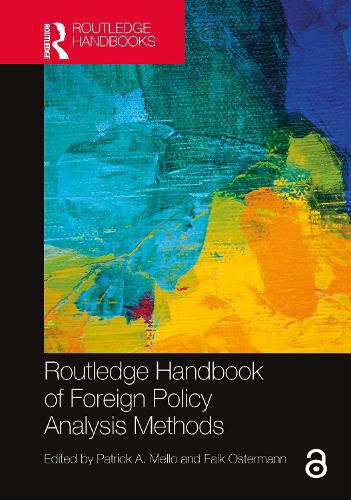Readings Newsletter
Become a Readings Member to make your shopping experience even easier.
Sign in or sign up for free!
You’re not far away from qualifying for FREE standard shipping within Australia
You’ve qualified for FREE standard shipping within Australia
The cart is loading…






The disintegration and questioning of global governance structures and a re-orientation towards national politics combined with the spread of technological innovations such as big data, social media, and phenomena like fake news, populism, or questions of global health policies make it necessary for the introduction of new methods of inquiry and the adaptation of established methods in Foreign Policy Analysis (FPA). This accessible handbook offers concise chapters from expert international contributors covering a diverse range of new and established Foreign Policy Analysis methods. Embracing methodological pluralism and a belief in the value of an open discussion about methods’ assumptions and diverging positions it provides new, state-of-the-art research approaches, as well as introductions to a range of established methods. Each chapter follows the same approach, introducing the method and its development, discussing strengths, requirements, limitations, and potential pitfalls while illustrating the method’s application using examples from empirical research. Embracing methodological pluralism and diversity and problem–oriented research that engages with real–world questions the authors examine quantitative and qualitative traditions, rationalist and interpretivist perspectives, as well as different substantive backgrounds. The book will be of interest to a wide range of scholars and students in global politics, foreign policy and methods–related classes across the social sciences.
$9.00 standard shipping within Australia
FREE standard shipping within Australia for orders over $100.00
Express & International shipping calculated at checkout
The disintegration and questioning of global governance structures and a re-orientation towards national politics combined with the spread of technological innovations such as big data, social media, and phenomena like fake news, populism, or questions of global health policies make it necessary for the introduction of new methods of inquiry and the adaptation of established methods in Foreign Policy Analysis (FPA). This accessible handbook offers concise chapters from expert international contributors covering a diverse range of new and established Foreign Policy Analysis methods. Embracing methodological pluralism and a belief in the value of an open discussion about methods’ assumptions and diverging positions it provides new, state-of-the-art research approaches, as well as introductions to a range of established methods. Each chapter follows the same approach, introducing the method and its development, discussing strengths, requirements, limitations, and potential pitfalls while illustrating the method’s application using examples from empirical research. Embracing methodological pluralism and diversity and problem–oriented research that engages with real–world questions the authors examine quantitative and qualitative traditions, rationalist and interpretivist perspectives, as well as different substantive backgrounds. The book will be of interest to a wide range of scholars and students in global politics, foreign policy and methods–related classes across the social sciences.